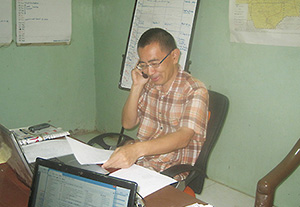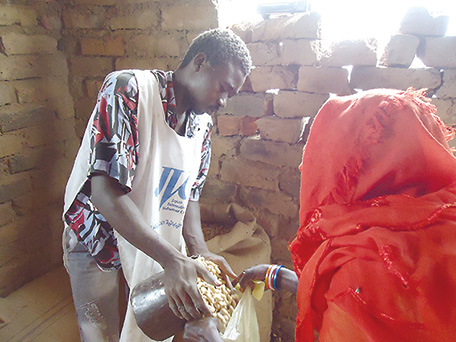Stories from the field 11
Helping IDPs to become self-reliant and get along with local residents in a land shaken by conflict
- Cooperation by an NGO for the development of vegetable fields and wells in Sudan, Africa

Mr. Imai at the NGO office in the capital city, Khartoum. He closely coordinates with the local staff to promote support. (Photo: JVC)
The civil war in Sudan, which continued for a long time since just after its independence in 1956, finally came to an end in 2011, resulting in the independence of South Sudan. However, part of Sudan remains unstable even after the end of the war. Currently more than 2 million internally displaced persons (IDPs) continue to take refuge in places like Darfur and South Kordofan.
Since 2010, Japan International Volunteer Center (JVC), an NGO that specializes in international cooperation, has been providing assistance for IDPs in South Kordofan Province, Sudan. Mr. Takaki Imai is the organization's local representative in Sudan. He is currently based in Khartoum for security reasons. However, he continues to work for South Kordofan by keeping in touch with the JVC's three Sudanese staff members in Kadugli, which is 700 kilometers away from Khartoum.
Kadugli is an area with farms and grazing land spreading out at the foothills of the surrounding Nuba Mountains. Local residents here make a living by cultivating land during the six-month-long rainy season, and during the dry season in the other half of the year, by making charcoal, collecting firewood, or going to a city for work.
Mr. Imai commented, “Approximately 40,000 IDPs have fled from where fighting was taking place to Kadugli. In the beginning, we offered them humanitarian assistance, such as distribution of foodstuffs. After a while, as we began to grasp the situation of the IDPs, we started to wonder if we could convince local residents to provide a portion of their land and let us establish vegetable fields so that the IDPs could secure an income. I think it was a great help that there was a positive attitude on the part of the local residents in Kadugli to accept the IDPs, as many of those IDPs had only escaped to the region because they had relatives or knew people in Kadugli.”
That said, it was the local residents who owned the land, so it was necessary to have discussions between local residents and leaders of IDPs in order to decide things like where to allocate vegetable fields. “I recognize our role to create an environment in which the two parties can forge a good relationship. We offered the opportunities, and then basically left discussion up to them. We persevered on with that way, and eventually saw local residents voluntarily inviting members of the IDPs' group to the discussion on local issues such as well digging.”

A JVC staff distributing seeds for people suffering from the dispute to help them start farming again. (Photo: JVC)
Through discussions between the two groups, it was eventually decided that a portion of land would be set aside for the IDPs to cultivate their own fields. In 2012, JVC halted its food assistance and began to help IDPs become self-reliant and cultivate crops during the rainy season. JVC realized that it was critical for the IDPs to be able to earn a living during the dry season as well, so in 2013, the organization began a project funded by Grant Assistance for Japanese NGO Projects1 to support the creation of vegetable fields and small-scale irrigation through the digging of new wells and repairs of old wells during the dry season. The goal set for this project was to have IDPs receive simple training in the growing of vegetables such as mulukhiya, okra, and arugula, and then use some of their harvest for food and some as a source of income through the sale of vegetables at markets. One IDP who took part in this project and who was able to cook and feed harvested vegetables to their children earnestly commented, “I no longer need to worry every morning about food when I wake up. It is wonderful.” The project was able to provide a great relief to IDPs tormented with so many worries.
Mr. Imai explained that the ability of the IDPs and local residents to take the initiative and their spirit of self-reliance were very important for the promotion of activities. “The local residents once came to us to request the repair of a well that had been broken and then abandoned for some time. However, it did not seem like they had any ideas or plans to inspect and repair the well themselves, so we did not say yes to their request immediately, but decided to wait and see the development of the situation. After a while, the local residents themselves repaired the well by sharing the small cost of repairs among themselves. They even formed a well management committee, considering that ‘We must manage our important wells ourselves.' They started to make preparations for the sustainable management of wells. I was surprised by this. In addition to that, when we first helped to make a vegetable field, we provided all of the seeds and farming tools, but after that first crop was harvested, the IDPs did not come to us asking for new seeds at the time of the second seeding. Instead, they went to the market, bought seeds themselves, and planted them. People in Sudan have a strong mindset of doing what they can by themselves.” At some point, the people of South Kordofan began to take up the work previously helped by the assistance team and to move it forward on their own. Mr. Imai commented that he could feel that this project had achieved something when he saw them develop that attitude.
Even today, Mr. Imai is working hard to help the IDPs build self-reliant lives while maintaining friendly relations with local residents. “I think that the ‘exit', which means the point at which external support ends for livelihood reconstruction assistance projects should be the stage at which IDPs and local residents, cooperating together, can secure a stable way to make a living year-round. I expect several villages will reach that stage in a short time.”
*1 A scheme by which the Ministry of Foreign Affairs offers funding cooperation for economic development projects and emergency humanitarian projects carried out by Japanese NGOs in developing countries and regions. The goal of this scheme is to enhance the capabilities of NGOs in expanding their international activities by helping them accumulate more experience.
<< Previous Page
Main Text | Statictics and Reference Materials | Stories from the field | Master Techniques, From Japan to the World - | ODA Topics
